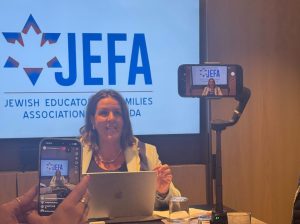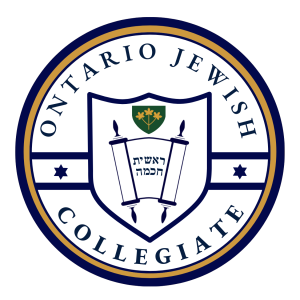TORONTO — Eitz Chaim Schools will celebrate its 90th anniversary at a dinner at Copper Creek Golf Club May 20.
 The second-oldest Jewish day school in Toronto, Eitz Chaim – like Associated Hebrew Schools, which dates back 100 years – began its existence as a supplementary school. It became a day school in the 1940s.
The second-oldest Jewish day school in Toronto, Eitz Chaim – like Associated Hebrew Schools, which dates back 100 years – began its existence as a supplementary school. It became a day school in the 1940s.
The Orthodox school’s modest beginnings in 1917 consisted of a single teacher in a one-room cheder for boys.
Today there are 850 students from nursery to Grade 8 spread among three campuses – a girls’ school in Thornhill, a boys’ school on Patricia Avenue, and a second girls’ school on Viewmount Avenue, the school’s first day school location.
But Eitz Chaim’s dean, Rabbi Isser Pliner, told The CJN he thinks that “the school probably has not drifted too far away from its original mission – to be a place where children are provided with an opportunity to have a [Torah] way of life inculcated.”
In its early days, when the school was first known as the Polishe Talmud Torah, it had a heterogenous student body, but today – with the proliferation of schools serving many different segments of the community – Eitz Chaim serves families who are “committed to a lifestyle of Torah Judaism,” Rabbi Pliner said.
Three years ago, following a merger with Thornhill Talmud Torah – a school that was started by Eitz Chaim parents – Eitz Chaim instituted a “Maharal” stream for boys, which involves extra study in the summer and uses a “more traditional method” of teaching Jewish subjects, focusing on knowledge of the texts per se with much review of the material.
“The point is that the children should internalize it,” said Rabbi Pliner.
He noted that the Maharal students are integrated into all school programming. “At the end of the day they’re Eitz Chaim kids and Eitz Chaim families.”
The rabbi, who headed a school in Pittsburgh before moving to Toronto six years ago, said that Eitz Chaim “still sees itself in the centre of its [Orthodox] community, but the community’s centre has moved to the right. If it remained the way it was 30 or 40 years ago, it wouldn’t be in the centre. It would be left-wing.”
Rabbi Pliner said the school is a “very modern, progressive, professionally run school” with “a very strong secular program,” special education resource programs, state-of-the-art libraries, and most recently, the beginning use of SMART Boards, interactive technology that opens new learning possibilities in the classroom.
He said the school, which is serving its fourth generation of students in some cases, has been a “trendsetter” in developing seven-foot-high replicas of Gemarah pages for use on the wall in beginning boys’ Gemarah classes. (Girls do not learn Gemarah at the school.)
In the 1920s Eitz Chaim took what at the time was also a progressive step, opening a separate girls’ class and hiring a female teacher for them.
Pauline Esco, née Spiegel, who was born in Poland and arrived in Canada at age 8 in 1936, remembers learning how to read Hebrew at D’Arcy Talmud Torah some 70 years ago when she was about 10 years old. “We started from the bottom: aleph bet and everything.
“There are great memories. The teacher [Celia Levitan, later Frisch] was wonderful. She had a lot of patience. But we didn’t get the training they do now [at Jewish day schools]. After school the kids were tired mentally and physically. You were anxious to get home for supper. There were no day schools at that time.”
The school “taught us something, and it remained with us,” said Esco, who grew up in a traditional Jewish home. Going to synagogue on Shabbat is “part of me,” she added.
By the time Esco was a student, the school had moved from its first downtown home, the Elm Street Shul, where classes were held after public school on weekdays for six hours and for another six hours on Sundays. Classes ran throughout the school year as well as in the summer.
There were subsequent homes downtown before the school purchased a building on D’Arcy Street. The latter building was rebuilt after a 1927 fire, and classes went from four hours to two hours but maintained a strong emphasis on Talmud, according to a history provided by the school.
The history, which will be reproduced in a journal for the dinner, is enhanced by reminiscences written by the school’s first principal, Rabbi Leibish Noble, who remained involved with the school for 40 years. His comments, translated from the original Yiddish, first appeared in a 25th anniversary journal in 1943, said Gloria Silver, the school’s development co-ordinator.
For further information about the dinner, call the dinner hotline at 416-225-1187, ext. 31 or e-mail [email protected]. The event is a fundraiser honouring the Joseph & Faye Tanenbaum Charitable Foundation, and will feature guest speaker Rabbi Shmuel Kamenetsky of the Talmudical Yeshiva of Philadelphia, an Eitz Chaim alumnus.






